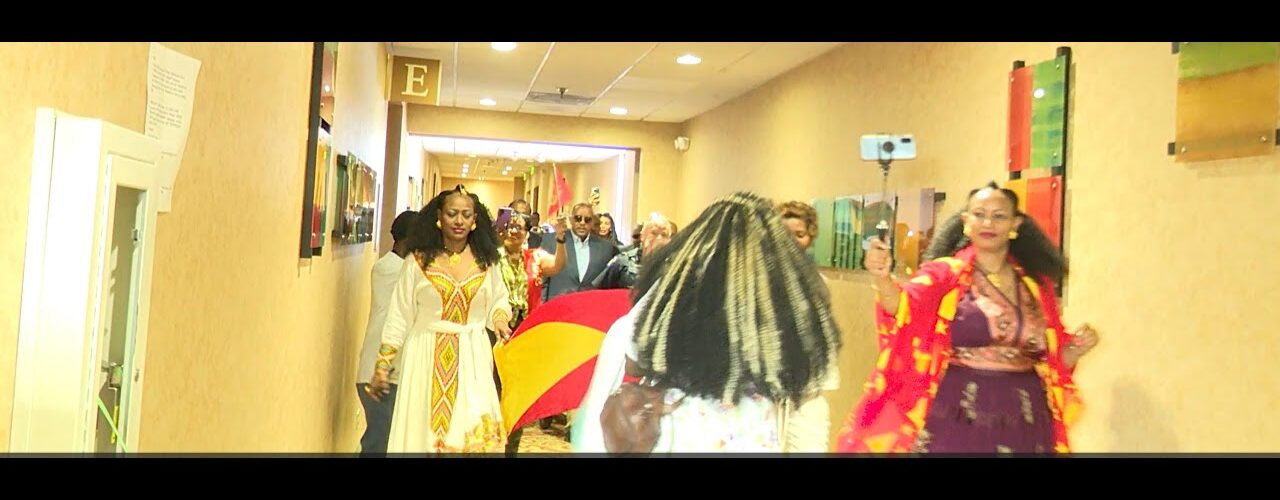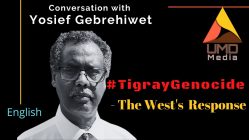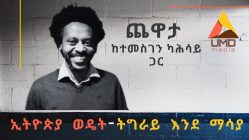Girmay Weldedawit*
July 24, 2024
Abiy’s political environment has compelled Tigrayans to clarify their positions before discussing the situation in Ethiopia. They often need to declare that they are not members of the Tigray People’s Liberation Front (TPLF) before critiquing Abiy’s policies on Tigray as genocidal. Similarly, I now find myself needing to clarify that I despise the TPLF before expressing my concerns about the Tigray Interim Regional Administration (TIRA) leadership. I sought asylum to escape one threat, but now I seek solitude to navigate another.
Tigray and Abiy Ahmed
From the beginning, it is crucial to clarify that Tigray has consistently misinterpreted Abiy’s rhetoric, mistakenly associating it with a past Ethiopia that Tigray viewed as being controlled by the Amhara. Abiy has manipulated this rhetoric to fuel hostility between the Amhara and Tigray.
The conflict between the Abiy-led Oromia Prosperity Party and Tigray didn’t originate from the latter’s aspiration to seize power, but rather from the former’s perception of Tigray and its cultural identity as a threat to its vision of a New Ethiopia. Abiy and his party envision a New Ethiopia where the dominance of “Northerner’s” values, is diminished, aiming instead for Oromo control and the promotion of Pentecostal religion, particularly the Prosperity Gospel. Abiy’s imperialist agenda embodies both ethnic and religious tendencies.
Tigray, possessing political and military strength along with a strong sense of nationalism, in Abiy’s eye, might unite various ethnic groups, posing a challenge to Abiy’s aspirations. Consequently, Abiy initiated a genocidal campaign in Tigray, dubbing it a “Law Enforcement Operation” . It was inevitable that he would turn his attention to the other Northerners, the Amhara .
Abiy remains entrenched in his mindset, unchanged even after the Pretoria Agreement that brought an end to the armed conflict. He finds himself compelled to retain power and take whatever measures necessary to realize his vision. Abiy and the TPLF came to terms under duress and external pressure. Consequently, there is little expectation for him to fulfill the significant provisions of the agreement, notably engaging in political dialogue to address the underlying causes of the conflict. Doing so would require him to abandon his aspirations. Rather than upholding the provisions outlined in the agreement, Abiy and his party have opted for actions aimed at fragmenting and dismantling the TPLF.
The Political Instrumentalization of Peace
The cessation of hostilities agreement signed on November 2, 2022, has resulted in a cessation of armed conflict. However, it is apparent that the pursuit of peace serves another, more strategic purpose. Peace is being utilized as a political instrument to dismantle the TPLF leadership. The Pretoria Agreement has effectively categorized members of the TPLF into two distinct groups: those deemed pro-peace and those labeled anti-peace. The former group consists of individuals in the Interim Administration, led by Getachew Reda, who was the chief delegate signing the peace agreement. The latter group is led by TPLF’s leader, Dr. Debretsion Gebremichael, who remains skeptical of the peace deal and its signatories.
Advocating for the full implementation of the Pretoria Agreement has led to accusations of warmongering. Calls for the restoration of Tigray’s territorial integrity, justice for the genocide in Tigray, concerns about the inadequate repatriation of IDPs as per the agreement, and apprehensions regarding the urgency of DDR are all perceived as acts of hostility against Abiy’s government. Despite Abiy’s administration’s engagement in hate speech against Tigray and the TPLF, calls for a response from the Interim Administration are unwelcome among its supporters, who argue that such actions are provocative. The notion of peace is thus becoming overrated, as the call for peace transcends its conventional understanding.
I shared my opinion during a live call on UMD’s coverage of the Pretoria Agreement signing, titled “Media Briefing on Ethiopia-Tigray Peace Negotiations,” which was streamed live on November 2, 2022. I remarked, “The best way to dismantle the TPLF is by having it sign this deal.” At that time, I had no suspicion that the delegate would use the COHA to eliminate the old guards of the Tigray People’s Revolutionary Front (TPLF).
My suspicion of a potential intention to dismantle the TPLF, or transform it into a party with a completely different perspective and leadership, started just one day after the signing of the COHA. The TPLF stated that the delegations it sent to Pretoria represented the regional government of Tigray, not the TPLF itself. Consequently, it claimed that it did not acknowledge the phrase “the deal was signed between FDRE and TPLF.” My concern deepened after Getachew Reda addressed the Tigray community in the US eleven months ago. In his speeches, I felt peace was overrated. He overemphasized the potential destruction of Tigray’s total capacity, saying, “In fact, what I want to say without concern for judgment is that because we were afraid of losing all our capacity, we saw signing the agreement as an advantage,” to instill a sense of defeatism so that people wouldn’t seriously question the implementation of the agreement if it fell short of expectations. He also highlighted “Tigray’s bravado” regarding the genocide, stating, “we have not achieved by bravado,” signaling a willingness to overlook the fact that Tigray had no option but to defend against a genocidal war. The speech that delivered the bad news about the TIRA’s acceptance of a prolonged implementation process was when he said, “We should know that a smooth interaction with the federal government is going to take time as there are elements within the government, you do not expect me to tell you they are, that are not happy the deal is signed.” This, in other words, means “let us give Abiy the time he wants to settle everything.” He also hinted at potential division within his party when he said, “There are also people from our side who are not happy with the peace deal.”
He also made a populist appeal to the community: “I know you will say, ‘We are silently perishing,’ upon seeing the long delay in the agreement’s implementation. Trust this: someone who fought for three years on the battlefield would never give up Tigray’s interests.”[1] I concluded that they were going to make concessions that the people of Tigray do not want, all in the name of peace.
In an interview with Woyen’s YouTube channel five months ago, Dr. Debretsion publicly disclosed the tense relationship between the delegates who traveled to Pretoria to sign the peace agreement and the TPLF leaders at home. He remarked, “There is genuine suspicion. They included articles that were not part of our discussions, and there were also articles that our delegates assured us would not be in the deal.” Dr. Debretsion also highlighted concerns about “internal and external enemies working together to annihilate the TPLF leadership, thereby disrupting the Tigray political community.”
A recent point of contention between the two groups is the legal status of the TPLF. Team Getachew seems to advocate for the TPLF to register as a new party, similar to the approach taken by Abiy Ahmed. On May 31, Getachew praised a new proclamation on party registration in a post on X, stating, “The Resolution of the Council of Ministers in one step is the right direction in consolidating peace.” However, this same proclamation was rejected by the TPLF leadership. Amanuel Assefa, Spokesperson of the TPLF stated that “the cancellation of TPLF has already been revoked by the Pretoria agreement.”
Tigray’s current political landscape
The current situation in Tigray mirrors the political landscape from six years ago, when Abiy Ahmed first came to power. The treatment of the TPLF today parallels what happened to the Ethiopian People’s Revolutionary Democratic Front (EPRDF) during his rise. Abiy effectively portrayed the EPRDF as being dominated by Tigrayans and the TPLF, blaming them for the country’s problems. This led to widespread animosity towards the TPLF, with many believing that their complete eradication was a necessary step. However, people did not anticipate that the replacement might prove to be even more perilous.
Tigray continues to face genocide. In areas occupied by Eritrean and Amhara forces, Tigrayans are enduring forced displacement and murder. Elsewhere in Tigray, the situation reflects a more subtle form of genocide—genocide by attrition. Essential life-supporting conditions were devastated during the active conflict, and there has been a persistent lack of efforts to restore them. As a result, people are starving, lacking medical care, and facing widespread unemployment, leading to silent suffering and death.
However, the discourse in the political landscape of Tigray are far from addressing such a debilitating condition. Tigray Interim Regional Administration (TIRA), conceivably swayed by a nascent alliance with the government led by Prime Minister Abiy, have exhibited a reluctance to actively advocate for the immediate enactment of the provisions delineated in the Pretoria Agreement. Furthermore, a conspicuous absence of formal condemnations from these entities regarding Prime Minister Abiy’s transgressions against the terms of the peace accord is apparent. Moreover, the TIRA’s focus on facilitating political and “democratic” reforms appears insufficient in mitigating the grave humanitarian crisis characterized by acts of genocide within the region. Effective intervention to halt genocide typically arises either through the triumph of the victim over the perpetrators or through external intervention aimed at safeguarding the targeted population.
The political landscape presents a messiah vs. devil drama reminiscent of the scenario when Abiy came to power. One similarity between Getachew and Abiy is that they became popular despite being members of a party that is widely disliked. This is because the old guards of the party are depicted as monstrous and demonic. Supporting the old guards is seen as siding with the devil, while supporting the new leaders is seen as supporting the messiah. This is the unfortunate reality in Tigray. The new leaders’ social media activists are engaged in spreading dehumanizing rhetoric with the potential intent to eliminate the old guards.
A prevalent discourse among opposition parties, influential stakeholders, and academic circles suggests that Tigray remains vulnerable to genocidal atrocities as long as the TPLF remains active. This view is also supported by Abiy, who seeks to mainstream it. The TPLF, has been the subject of accusatory rhetoric in connection with the perpetration of genocide. However, such assertions, while reflective of mounting frustrations, fail to capture the complexity of the situation. Implicit within this perspective is a tacit endorsement of the genocidal agenda, wherein individuals or political entities espousing divergent views are deemed expendable.
The alternative perspective posits that any critique of Prime Minister Abiy Ahmed’s policies could exacerbate harm inflicted upon the region of Tigray, thereby equating advocacy for the Pretoria Agreement’s enforcement with an act of aggression against Abiy’s administration. Regrettably, it’s astonishing to witness members of the TIRA placing their trust in Abiy. There are leaders within TIRA who, ignoring that it was a genocidal war, wrongly believe that had TPLF complied with Abiy and his party, there would have been no conflict with Tigray.
What is particularly alarming is the potential for Tigray’s political landscape to facilitate internal strife and atrocities within its own borders. What Tigray and the TPLF represented to the new EPRDF leadership during Abiy’s tenure is akin to what even some members of the TIRA’s leadership are saying today. In an interview on April 26, 2024, with Redae Halefom on Cyber Power Tigray’s YouTube channel, the conversation echoed Abiy’s divisive rhetoric aimed at dismantling the EPRDF. Abiy had implied that the TPLF had made the EPRDF leadership puppets and viewed the Oromos as unworthy of leading the party. Redae’s remarks revived the “we were puppets” narrative, sending the political message that certain members within the TPLF, from a specific community in Tigray, monopolized power and consider Tigrayans from other regions as unfit to lead Tigray.
The tendency to attribute the genocide to Amhara Special Forces and Eritrean Defense Forces has been evident since the early days of the Pretoria Agreement too. Despite Abiy Ahmed’s warning for another round of genocidal war in Tigray, TIRA leaders chose to issue a statement warning the Amhara Regional Government about incorporating annexed territories into its school curriculum. The statement seems misdirected, as it fails to address the primary actor, Abiy and his party, who are playing a significant role in this situation. Feeding into Abiy’s belief that there are TPLF leaders and certain army leaders who want war, seek to create an alliance with Eritrea’s government and Fano forces, and are extracting Tigray’s resources, is laying a groundwork for yet another “Law Enforcement Operation” by Abiy in Tigray. This time, Abiy seems to justify the war by alleging that there are still TPLF members who seek conflict and persist in exploiting Tigray’s resources. Of course, the fate of Tigray Genocide Inquiry Commission is also uncertain.
The situation in Tigray mirrors the trajectory witnessed in Ethiopia since Abiy’s ascent to power. There is a notable tendency to address issues that fail to address the root causes, coupled with a reductionist narrative attributing all problems to a specific political group or community. This approach risks perpetuating rather than resolving the underlying challenges facing the region.
* Former Lecturer at Arba Minch University, Department of Sociology and Social Anthropology
[1] After listening to his speech to the Tigrayan community, I told my fellow Tigrayan friends, “Getachew is Abiy with academic caliber.” This led to ostracization, which I don’t think will end soon.
Editor’s Note: The opinions expressed in the articles published on UMD Media are solely those of the individual authors and do not necessarily reflect the views or opinions of the editorial team or UMD Media as an organization. The publication of any opinion piece does not imply endorsement or agreement by UMD Media. Readers are encouraged to critically evaluate the content and form their own conclusions. Leave your comments below. Send us your thoughts and reflections to umd.media.2020 at gmail dot com.
Guidelines for contributors All contributions and comments submitted to UMD Media must adhere to the following guidelines. Respectful Language: Avoid using ethnic adjectives that generalize or portray an entire ethnic group in a negative light. Such language is harmful, divisive, and contrary to our commitment to fostering a respectful and inclusive environment. No Incitement: Content that incites hatred, violence, or discrimination against any individual or group based on ethnicity, race, religion, etc will not be tolerated. Constructive Dialogue: We encourage constructive dialogue and the sharing of diverse perspectives. However, it is essential to express opinions in a manner that respects the dignity and humanity of all individuals and groups. Moderation and Enforcement: Our editorial team reserves the right to moderate and, if necessary, remove any content that violates these guidelines. Repeat offenders may be subject to account suspension or banning. By contributing to our platform, you agree to abide by these guidelines and help us maintain a respectful and inclusive community.
Subscribe to UMD Media channel. Join UMD Media Telegram Channel: https://t.me/UMDMedia




